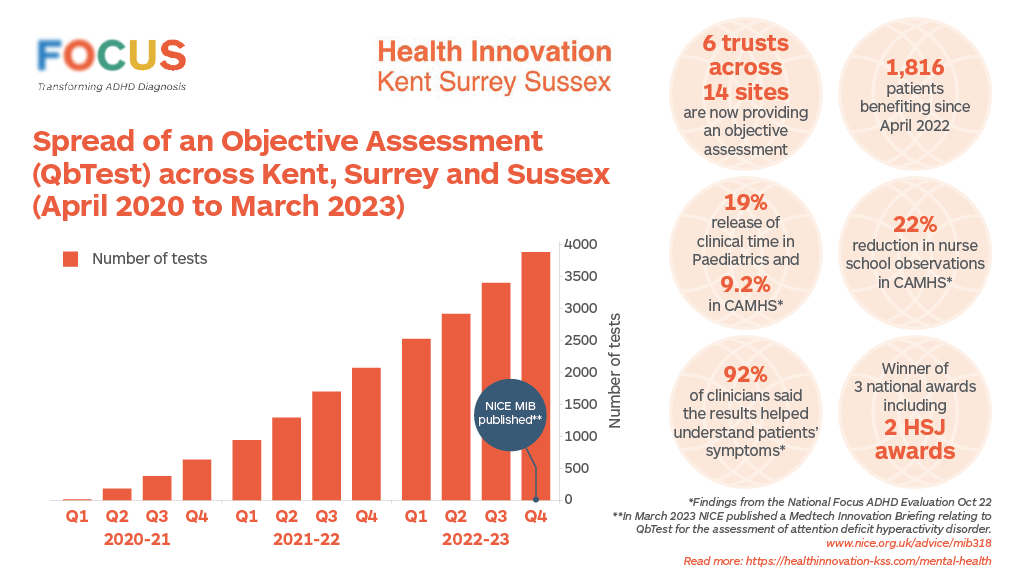Attention deficit hyperactivity disorder (ADHD) is a behavioural disorder that includes symptoms such as inattentiveness, hyperactivity and impulsiveness. It affects around 5% of school-aged children worldwide and can have a large impact on personal, academic, family and social interaction.
In the UK children can wait on average 18 months from their first appointment to receiving a formal ADHD diagnosis and the annual cost of ADHD assessments to the NHS is estimated at around £23m.
Health innovation networks (formerly AHSNs) are working with mental health trusts and community paediatric services to improve the assessment process for Attention Deficit Hyperactivity Disorder (ADHD) using computer-based tests (measuring attention, impulsivity and activity). Health innovation networks, including Health Innovation KSS, are supporting its wider spread during 2020-2022 as part of an AHSN Network national programme.
We are supporting an ADHD intervention which uses technology created by health technology company Qbtech Ltd. The technology, QbTest, measures a patient’s attention, impulsivity and motor activity all at the same time. These indicators are core symptoms of ADHD and accurate measurement adds objectivity to support timely diagnosis.
The intervention has shown a reduction in time to diagnosis by 153 days (median). Using this intervention increases staff capacity by reducing the number of appointments needed for diagnosis and by ruling out ADHD sooner for ambiguous cases. Releasing capacity of clinicians can help reduce waiting lists and allow clinicians more time to concentrate on complex cases.
Health Innovation KSS has supported the mobilisation of 16 sites across six NHS Trusts. In total 1,286 tests have taken place since 2019.

To learn more about the outcomes of the FOCUS ADHD programme across the South East and Dorset, check out this Flashcard.
To find out more, please contact Becca Randell, Implementation Lead.
To mark ADHD Awareness Month, October 2021, we asked some young people and a parent in Medway “what’s it like living with ADHD?”
Young people from Medway talk about what it’s like to live with ADHD in a video to mark ADHD Awareness Month, October 2021.
National Institute for Clinical Excellence Publishes Medical Innovation Briefing Appraising QbTest
The National Institute for Clinical Excellence (NICE) has published a Medical Innovation Briefing (MIB) highlighting the benefits of objective testing technology (QbTest) when used as part of a comprehensive ADHD assessment.
Since 2020, QbTest has been part of the Health Innovation Network’s Focus ADHD programme to help improve diagnoses for ADHD in young people. It is currently being used in 66 trusts across 133 NHS services and has delivered over 50,000 tests since the national programme launched.
Medical innovation briefings (MIB) are NICE advice, designed to support NHS and social care commissioners and staff who are considering using new medical devices and other medical or diagnostic technologies.
Key findings include:
- Experts recognise QbTest as an addition to routine clinical assessment of ADHD
- The NICE evidence review and ADHD experts confirm that QbTest helps clinicians make accurate decisions, saving time and money
- NICE reports reduced ADHD waiting list achieved through the use of QbTest

 +44 (0)300 303 8660
+44 (0)300 303 8660
 enquiries@kssahsn.net
enquiries@kssahsn.net
 @kssahsn
@kssahsn